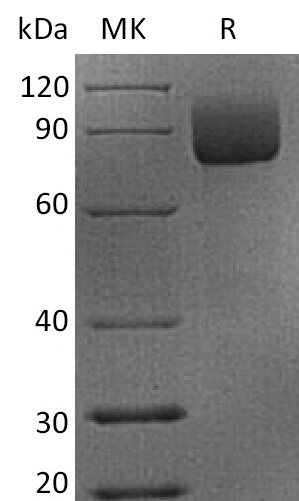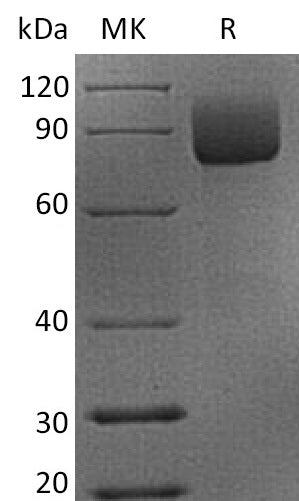Product Details
Product Details
Product Specification
| Species | Rhesus macaque |
| Accession | F7F486 |
| Amino Acid Sequence |
Pro20-Lys292 i,, with the C-terminus human IgG1 Fc tag |
| Expression System | HEK293 |
| Molecular Weight |
80-110 KDa (reducing conditions) |
| Purity | >95% by SDS-PAGE |
| Endotoxin | <1EU/μg |
| Conjugation | Unconjugated |
| Tag | Human Fc Tag |
| Physical Appearance | Lyophilized powder |
| Storage Buffer | PBS, pH 7.4 |
| Reconstitution |
|
| Stability & Storage |
|
Background
CD19 is a single-pass type I membrane protein containing 2 Ig-like C2-type (immunoglobulin-like) domains. CD19 is expressed on follicular dendritic cells and B cells. In fact, it is present on B cells from earliest recognizable B-lineage cells during development to B-cell blasts but is lost on maturation to plasma cells. CD19 primarily acts as a B cell co-receptor in conjunction with CD21 and CD81. Upon activation, the cytoplasmic tail of CD19 becomes phosphorylated, which leads to binding by Src-family kinases and recruitment of PI-3 kinase. CD19 Assembles with the antigen receptor of B lymphocytes in order to decrease the threshold for antigen receptor-dependent stimulation. Defects in CD19 are the cause of immunodeficiency common variable type 3 (CVID3) which is a primary immunodeficiency characterized by antibody deficiency, hypogammaglobulinemia, recurrent bacterial infections and an inability to mount an antibody response to antigen.
Picture
Picture
SDS-PAGE



